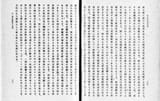Search Results
6/29/2025, 10:19:15 PM
>>212238056
>they are both shit
>syllabaries still shit
I don't know, they look just fine to me.
>spaces between words no, that's going too far
Quite literally not necessary.
>do a mega spelling reform 70 years ago that makes reading old stuff near impossible
It's not anywhere near impossible, very much possible for any native or somebody who has studied to a decent level in fact. New kana and new kanji aren't much of a problem, the biggest problems are some characters that aren't usually written with kanji now being written with them back then, as well as the simple linguistic and cultural gap between then and now(which you'll experience with all languages).
>pronunciation differences depend on tiny diacritics
What's wrong with that? The only thing that might be bad is that the one that changes to P can be hard to tell apart from the one that changes to B when there font size is small, but even then you can tell from context.
>in fact they are worse now because you added letters that are just slightly smaller version of existing letters
This was intentionally done to make reading easier. It's just a small change from 残つて to 残って, nothing more. Not really a necessary change in my opinion, it took me reading like 3 pages of old stuff to get used to it.
>suddenly start writing imported acronyms and numbers in the latin alphabet anyway
>now your writing system is a chimera of 4 different writing systems
>meanwhile you have accumulated loanwords from every language you've ever had contact with
>you say temp work in german, backpacks in dutch, bread in portuguese, electric plugs in late 1800s english, etc
Well so what? It may sound ridiculous but it's completely a non-problem, and as for loanwords literally every language is like that. Even 90% of the cusswords I know in Turkish do not come from it but from the languages that are spoken near us.
>boatloads of onomatopeia
Le soul or whatever. I guess it can be kind of irritating.
>they are both shit
>syllabaries still shit
I don't know, they look just fine to me.
>spaces between words no, that's going too far
Quite literally not necessary.
>do a mega spelling reform 70 years ago that makes reading old stuff near impossible
It's not anywhere near impossible, very much possible for any native or somebody who has studied to a decent level in fact. New kana and new kanji aren't much of a problem, the biggest problems are some characters that aren't usually written with kanji now being written with them back then, as well as the simple linguistic and cultural gap between then and now(which you'll experience with all languages).
>pronunciation differences depend on tiny diacritics
What's wrong with that? The only thing that might be bad is that the one that changes to P can be hard to tell apart from the one that changes to B when there font size is small, but even then you can tell from context.
>in fact they are worse now because you added letters that are just slightly smaller version of existing letters
This was intentionally done to make reading easier. It's just a small change from 残つて to 残って, nothing more. Not really a necessary change in my opinion, it took me reading like 3 pages of old stuff to get used to it.
>suddenly start writing imported acronyms and numbers in the latin alphabet anyway
>now your writing system is a chimera of 4 different writing systems
>meanwhile you have accumulated loanwords from every language you've ever had contact with
>you say temp work in german, backpacks in dutch, bread in portuguese, electric plugs in late 1800s english, etc
Well so what? It may sound ridiculous but it's completely a non-problem, and as for loanwords literally every language is like that. Even 90% of the cusswords I know in Turkish do not come from it but from the languages that are spoken near us.
>boatloads of onomatopeia
Le soul or whatever. I guess it can be kind of irritating.
Page 1
